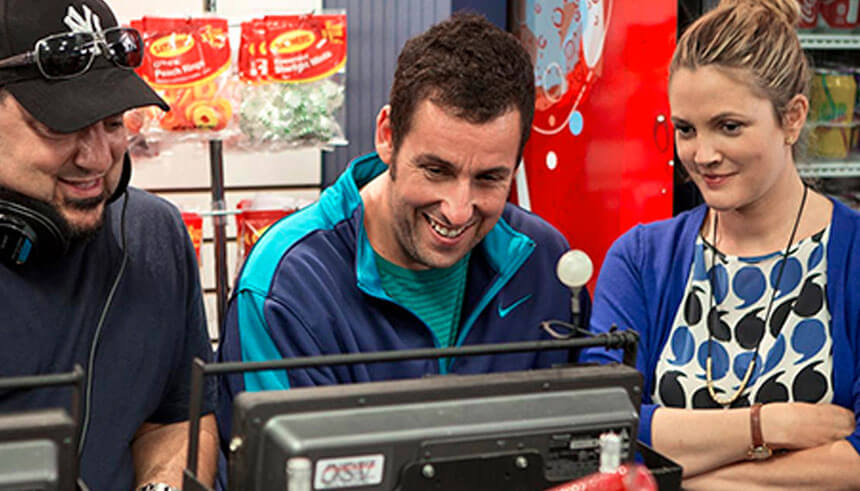Entertainment
Tax Credits Fuel Film Industry Boom Beyond California

Celebrity paparazzi can find a gold mine walking the streets of Atlanta and other states.
Just in the past month, Jennifer Aniston, Kate Hudson and Julia Roberts (“Mother's Day”); Selena Gomez (“Neighbors 2: Sorority Rising”); and Jennifer Lawrence (“Passengers”) have all been spotted in town, according to the many different Twitter feeds devoted to scouting movie shoots in the Atlanta area.
It's not a surprise that Atlanta has become a hotbed for the starstruck. Ever since the state of Georgia approved a series of tax credits in 2008 for the television and film industry, Atlanta has gone from a bit player to taking a leading role.
“Like any industry, there are certain iconic, name brands,” says Gary Powell, publisher of Oz Magazine, a trade magazine for the film and TV industry. In the entertainment world, “there are names like Panavision and Paramount and EUE/Screen Gems. These all now have a strong presence in Georgia.”
Georgia isn't the only state that's used tax incentives to generate a video-production industry. Wilmington, N.C., was a boomtown for film and TV productions in the 1980s and 1990s, after EUE/Screen Gems built a studio there. After North Carolina began losing films to locations overseas, the state passed a new tax credit in 2006 that revived the industry.

Louisiana's 2002 tax credit also has created a boom in productions there. Vancouver, Canada, has been able to capitalize on being in the same time zone as Hollywood, but having lower costs, to become the locale for hundreds of productions. New York hasn't lost its luster, either; it remains the second-busiest location for filming in the United States, after California, says Stephen Weizenecker, a partner with Barnes & Thornburg LLP who advises entertainment-related businesses on tax incentives and other financial matters.
The decision about where to shoot a film or TV series is almost entirely a result of the financial equation. Producers scan the entire country for tax credits to figure out which location offers them the best bang for their buck, he says.
“Except for when the location is the character, like an iconic location like the Brooklyn Bridge, tax credits are one of the most major considerations,” Weizenecker says.
“Major studios and major indie producers, they'll look at the tax incentive first, and then try to shoehorn the project into those locations,” he says.
Georgia's incentives are some of the most generous in the United States. The state gives producers a 20 percent base credit, as long as the production spends at least $500,000. A production can get an additional 10 percent credit if it figures out a way to place a Georgia logo somewhere in the story.
The items that qualify run the gamut, from insurance to original music scoring, from heating and air conditioning equipment to cameras and lighting; all services or products must be bought from a Georgia-based company to qualify.
Some states try to win on price. Georgia's next-door neighbor Alabama offers tax credits up to 35 percent, besting Georgia's top rate of 30 percent.
Other states, including Colorado, Minnesota and Oregon, offer rebates instead of transferable tax credits. Some producers see rebates as a better deal, or at least a quicker way to see the financial benefit.

The incentives produce a big impact. The Georgia Department of Economic Development estimated that feature film and television productions generated an economic impact of $6 billion in Georgia in the 12-month period ending June 30, 2015. That's a 94 percent increase from the $3.1 billion impact for the same period three years earlier.
Not everyone is enamored of the tax credits. The Louisiana Budget Project has criticized the state's tax incentives, saying they reward out-of-town producers with little benefit to the state's residents.
Even so, tax credits can create a game of chasing the rabbit. Vendors and suppliers move around the country, opening satellite offices in the search for markets to sell their wares. Haddad's, a Pittsburgh company that leases trailers, trucks and electric generators, opened an Atlanta-area office in 2013.
Even businesses as ho-hum as catering, shuttle vans and accounting firms move to where the opportunity is. Board Brothers, a Burbank, Calif.-based distributor of mats, layout boards and other floor coverings for film productions, opened an Atlanta location in 2011.
There are restrictions on some of the business opportunities. Many jobs related to film production are controlled by union shops, like the International Alliance of Theatrical Stage Employees, Moving Picture Technicians, Artists and Allied Crafts of the United States.
And tax credits themselves aren't a magic bullet. Sometimes a state will approve a tax incentive and it really doesn't work. Iowa, for instance, implemented a tax credit, but the state was never popular with producers, Weizenecker says. That wasn't a problem in Georgia, which had plenty of infrastructure, since CNN and The Weather Channel are among the industry players calling Atlanta home.
“If you don't have at least some of the bare-bones infrastructure, it's not going to work,” he says.
But then there are the boffo success stories. Pinewood Studios, a British studio that's filmed James Bond movies, recently opened a 288-acre facility in Fayetteville, Ga., south of Atlanta, where Marvel is shooting many of its films, including “Ant-Man.” Panavision, which designs, manufactures and rents cameras, opened a satellite office near Pinewood in September. EUE/Screen Gems has converted a portion of the former Lakewood Fairgrounds in Atlanta into a 33-acre studio complex, where the “The Hunger Games: Mockingjay” was shot, along with two films in the “Divergent” series.
And to think it all began with the tax incentives.
“When a production company can recoup up to 30 percent of its investment, and it is investing millions,” Powell says, “it’s hard not to take a hard look at states with production tax credits.”
Sign up for the Reach Further Newsletter
We’ll keep you in the know about the latest US-Asia business news and trends.
Suscríbase al boletín Reach Further
Lo mantendremos informado sobre las últimas noticias y tendencias comerciales entre Estados Unidos y China.

